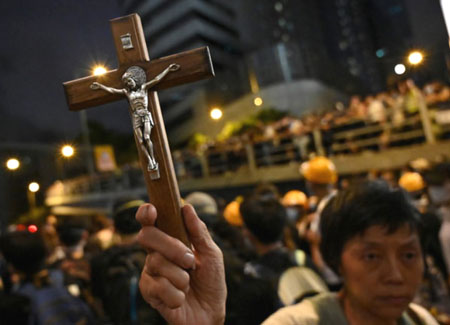by WorldTribune Staff, July 13, 2020
The oppressive restrictions placed on religious people on mainland China are already being felt in Hong Kong in the wake of the Chinese Communist Party’s new national security law which essentially ended Hong Kong’s autonomy.
“The new law ends the region’s autonomy and the hope that the demands of pro-democracy protesters will be met any time soon. Christians who participated in the demonstrations now believe that they will be targeted if they don’t toe the party line,” Alessandra Bocchi, a journalist who extensively covered the pro-democracy demonstrations, wrote for National Review on July 13.

On the mainland, Christians who defy the communist government’s control of their churches reportedly face persecution, arrest, and detention.
“Underground churches are destroyed and crosses burned. Translations of the Bible must be approved by China’s Communist Party and often modified to meet its demands,” Bocchi noted.
The fear of reprisal against religious faithful in Hong Kong has already had an effect.
“Religious leaders who had previously supported the Hong Kong protests have now expressed approval for the national security law,” Bocchi noted. “The main religious denominations in Hong Kong were summoned to a meeting at the Liaison Office in June, before the implementation of the law, and expressed support for the measure afterward. ‘It appears that they are closely monitored by the government,’ one of the Catholic lawyers I spoke with told me.”
Cardinal Tong, the apostolic administrator of Hong Kong, had pleaded for the Hong Kong government to “listen to the voices of the people” during the protests in 2019. After attending the meeting in June, however, he sounded a different note and claimed that the new national security law “doesn’t threaten religious freedom.”
In Hong Kong, Christians had enjoyed religious freedom guaranteed by the region’s legal independence, which provided its citizens basic rights including freedom of expression and religion.
“Christians, more than 10 percent of Hong Kong’s population, held peaceful rallies during the protests by singing hymns to affirm their faith. Thousands took to the streets, and many Protestants and Catholics united to defend a common cause with pro-democracy protesters,” Bocchi wrote.
But the national-security law which went into effect in Hong Kong on June 30 now prohibits secession, sedition, terrorism, and collusion with foreign forces.
“Those terms are so broadly defined that they can be used arbitrarily to prohibit any form of dissent. What worries religious minorities, and Catholics and other Christians in particular, are the law’s collusion and subversion and clauses,” Bocchi wrote.
The sedition clause effectively prohibits Christians from criticizing the Chinese government. Before the national security law was enacted, Christians in Hong Kong had spoken out against the communist government’s many injustices in mainland China.
“Now, many refrain from voicing any concerns toward issues that can be defined as ‘state secrets,’ ” a Catholic lawyer who works in a financial-regulatory body told Bocchi.
The collusion clause forbids Christians from seeking support from abroad, including the Holy See. With the pope in Rome, the Catholic Church is, by Beijing’s definition, a foreign institution.
“This measure can easily be used to target and penalize churches, especially the Catholic diocese which receives instructions and directions from the Vatican,” another Catholic lawyer in Hong Kong told Bocchi. “The churches can be ordered to disband and their assets can be confiscated if they breach the law.”
Violation of one of these laws carries a maximum sentence of life imprisonment.
“The main issue is that Hong Kong is powerless against such rulings,” Bocchi noted. “There is no guarantee that those charged or suspected under the law will not be extradited to mainland China. But under the law, proceedings will be tried without a jury in Hong Kong. So instead of the extradition law proposed in 2019, the national-security law might simply bring China’s rule to Hong Kong. Inspired by the British common-law system, Hong Kong’s Basic Law guaranteed freedom of expression and religion, but the national security law overrides those rights.”
Intelligence Brief __________ Replace The Media
